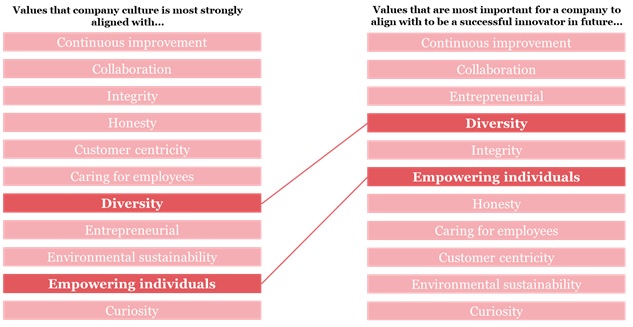Even though a majority (88%) agree that successful organizations encourage innovation at every level and within every team, this does not always translate into tangible strategy
As many as 88% of innovation leaders agree that successful organizations encourage innovation at every level and within every team. However, only16% of companies include ‘empowering individuals’ as an essential part of their corporate culture. This is the finding from a survey of senior decision makers with involvement in innovation, conducted by Kaspersky with the help of independent research company Savanta.
The linear approach to innovation suggests that senior management initiates this process while subordinate roles are only engaged when it comes round to execution. However, this is a concern as many in top management positions within enterprises may overlook business opportunities that employees who directly interact with customers or develop products can identify.
That’s why the absolute majority of innovation leaders believe that to be successful organizations should nurture an innovative mindset throughout the entire company. This will create a working atmosphere where everyone feels comfortable to share their thoughts on new ways of working. Moreover, 65% think that innovations are more effective when they are generated by employees.
Nonetheless, only 16% of respondents feel that their organizations now consider ‘empowering individuals’ as an essential part of their corporate culture. While it ranks next to last in the list of the most common values, its position is higher in the list of the values that are important to be innovative.
Interestingly, diversity is also ranked higher as a value that is required to be successful. This suggests that innovations call for a multicultural environment and people with different backgrounds to encourage more diverse opinions and ideas.

The difference between current values and ones that are important for future success
“To unleash full innovative potential, it’s not enough to have a dedicated department. The best results can be achieved when every employee has a voice and can contribute their ideas. Business leaders should encourage and curate this process in their organizations. And executives’ experience and views are more than helpful during the latter stages to align promising ideas with company strategy,” comments Vitaly Mzokov, Head of Innovation Hub, Kaspersky.
To support bottom-up innovations Kaspersky recommends the following advice:
- Regularly highlight the importance of innovations in internal communications. This should be done both at C-level and through individual sync-ups with team managers.
- Implement a dedicated program that allows employees to propose new business ideas and opportunities. Set clear selection criteria, review procedures and committee who chooses the most promising ideas. Additionally, motivate employees with a reward program for successful concepts.
- To enhance not only idea generation but the execution of projects, organize a department where employees can work on their selected ideas. It should be separate from the core business and solely dedicated to innovation. They can still use resources and expertise from within the company, but could be autonomous from mechanisms that may stifle the startup mindset. For example, this subdivision can test its hypotheses on loyal customers to improve the offering based on their feedback.
The full report is available by the link.
About the research
In summer 2020 Kaspersky commissioned Savanta, an independent market research agency, to explore a number of areas relating to corporate innovation. Innovation is the process of introducing new ideas, technologies, methodologies, services, or products that aim to affect positive change within businesses.
304 senior decision makers with an involvement in innovation, working in Europe, MEA, APAC, LATAM, North America and CIS were surveyed online in July 2020. These employees worked in a range of industries and in larger organisations (500+ employees). Following the surveys, 15 in-depth qualitative interviews were conducted with senior decision makers involved in innovation, working in larger organisations across a range of industries and specialisms.
About Kaspersky
Kaspersky is a global cybersecurity company founded in 1997. Kaspersky’s deep threat intelligence and security expertise is constantly transforming into innovative security solutions and services to protect businesses, critical infrastructure, governments and consumers around the globe. The company’s comprehensive security portfolio includes leading endpoint protection and a number of specialized security solutions and services to fight sophisticated and evolving digital threats. Over 400 million users are protected by Kaspersky technologies and we help 250,000 corporate clients protect what matters most to them. Learn more at www.kaspersky.com.
